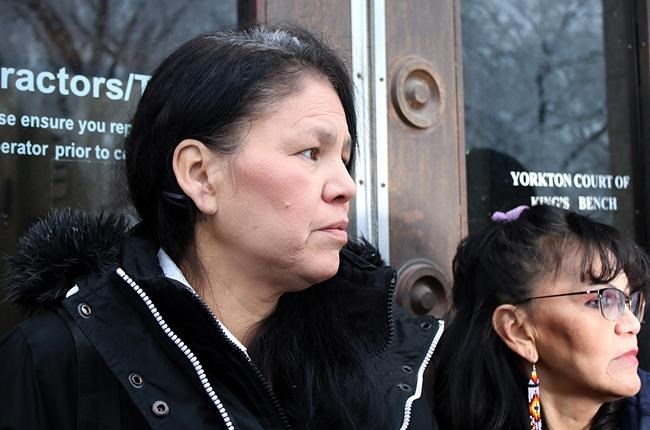YORKTON, Sask. — Two sisters who have spent nearly 30 years in prison for what they say are wrongful murder convictions each held an eagle feather while they testified at their bail hearing Tuesday about their desire for freedom.
“I am a strong believer in my prayers and my culture,” Odelia Quewezance said before the hearing began in Yorkton, Sask.
“I’m nervous, but I feel strong in my heart. I have nothing to hide.”
Odelia and Nerissa Quewezance were convicted in 1994 of second-degree murder in the death of 70-year-old farmer Anthony Joseph Dolff, near Kamsack, Sask.
Defence lawyers are asking for the sisters to get a conditional release while their case is undergoing a federal conviction review. The federal Justice Department started the review last year, saying there may be a reasonable basis to conclude there was a miscarriage of justice.
The sisters from the Keeseekoose First Nation have always maintained their innocence. Another person, who was a youth at the time, confessed to the killing.
Crown prosecutors do not want the sisters released and argued there's too much risk.
A judge recently overturned a ban on media publishing what happens during the two-day bail hearing.
The Crown prosecutor asked Odelia Quewezance about her criminal record and previous times she had breached conditions of parole or temporary release during her sentence.
"Today I'm admitting I struggled with addiction, I struggled with intergenerational trauma," Odelia Quewezance told court.
"Today I'm here and I'm proud of myself."
She talked about accessing programming, treatment and counselling and said she's committed to being a mother to her children. She is looking to be released to the home where her partner lives with her twin daughters in Saskatchewan.
"My family, that's what keeps me going," she said.
Odelia Quewezance was 20 years old and her sister was 18 when the pair was arrested for the 1993 stabbing death of the farmer.
Court heard the youth confessed during a preliminary inquiry and trial the following year. The Crown said the sisters were also able to testify during that trial.
But prosecutor Kelly Kaip said that Dolff was never able to share his story.
The Supreme Court of Canada declined to hear their appeal three years later.
The elder sister received day parole last year with strict conditions. She is currently staying at the YWCA in Regina and said it's difficult being around people in the throes of addiction.
Nerissa Quewezance's parole was denied and she has remained behind bars in Fraser Valley Institution for Women in British Columbia.
The Crown prosecutor also questioned Nerissa Quewezance about times she didn't follow conditions when she was given temporary releases. She admitted she, too, struggled with addiction.
She told court it was partially linked to "trauma for being incarcerated for 30 years." She is looking to stay with Congress of Aboriginal Peoples National Vice-Chief Kim Beaudin in his Saskatoon home if she gets conditional release.
Their lawyer, James Lockyer, asked her how being institutionalized all those years has affected her behaviour.
"It affects my way of thinking, my thoughts, my actions," Nerissa Quewezance told court. "I want to have my freedom back that was taken away."
Court heard how the Innocence Canada and the Federation of Sovereign Indigenous Nations are to provide supports to the sisters if they are released.
Sen. Kim Pate, who was the executive director of the Elizabeth Fry Society, told court she had known the sisters since their original incarceration. The society works with women behind bars.
"I would continue to welcome them into my home," Pate told court.
Pate told court how 50 per cent of federally incarcerated women are Indigenous. She said successful release hinges on community support, a safe place and women having something meaningful in their lives.
"Hope is vital," Pate said.
The judge told court that he would be reserving his decision for a later date. The bail hearing is set to continue Wednesday.
When the criminal conviction review process is over, a report and legal advice will be prepared for the federal justice minister. The minister can then order a new trial or appeal, or dismiss the application if he is not convinced there has been a miscarriage of justice.
Jay Koch, Odelia Quewezance's partner of 26 years, told court he wants the mother of his children to come home. He said every visit she's been able to have at their home over the years has meant everything to their children.
"The girls are really, really happy she's there."
This report by The Canadian Press was first published Jan. 17, 2023.
Kelly Geraldine Malone, The Canadian Press
